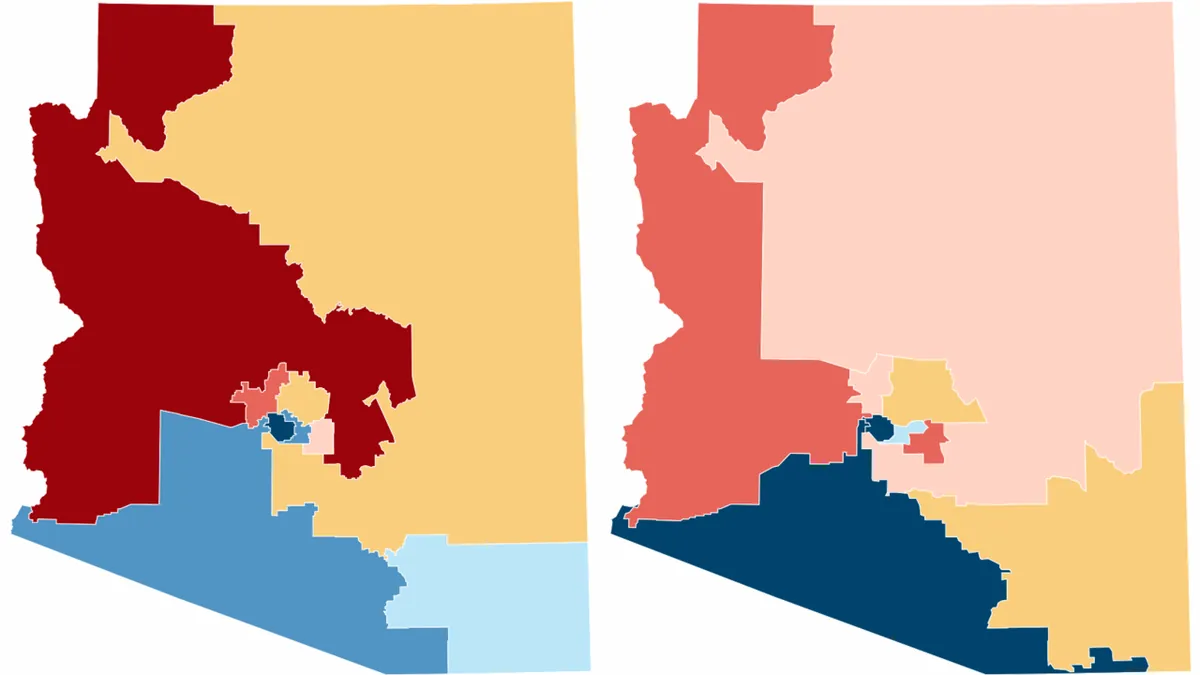In a rare competitive primary for Arizona's 3rd Congressional District, Democrats faced a delicate balance between ensuring accurate vote counts and maintaining trust in the election system. The July 30, 2024 primary, which occurred in one of the state's safest Democratic districts, resulted in a remarkably close outcome, necessitating an automatic recount.
The district, created in 1913 and represented by Democrats since 2003, encompasses parts of Phoenix and its suburbs. With approximately 313,000 registered voters, it has the smallest electorate among Arizona's nine districts. The area is predominantly Latino and working-class, reflecting the state's significant Latino population of about 32%.
The primary race pitted two progressive candidates against each other: Yassamin Ansari, a 32-year-old former Phoenix City Council member, and Raquel Terán, a 46-year-old former state lawmaker. Both candidates focused on issues such as affordable housing, climate change, and abortion rights, reflecting the district's liberal leanings.
The campaign saw unprecedented spending, with over $5.6 million in ad expenditures. This level of investment highlights the increasing competitiveness of Arizona's politics, which has shifted from solidly Republican to more balanced in recent years.
After the initial count, only 42 votes separated the candidates, triggering an automatic recount under a law implemented in 2021. The recount process, conducted in Maricopa County—the fourth-most populous county in the US—revealed the meticulous nature of Arizona's election system.
The final results, announced on August 20, 2024, showed Ansari winning by just 39 votes. The recount identified three ballots that slightly favored Terán, demonstrating the system's ability to catch and correct minor discrepancies.
Throughout the process, both candidates and party officials were acutely aware of the broader context. Arizona, a battleground state in recent presidential elections, has been at the center of election integrity debates since 2020. The state's unique characteristics, including its year-round Mountain Standard Time observance and its status as the last contiguous state to join the Union, have often placed it in the national spotlight.
Terán quickly conceded after the recount, emphasizing the importance of trust in the election process. This approach reflects the Democrats' strategy to maintain confidence in Arizona's voting systems, particularly in light of ongoing challenges to the 2022 gubernatorial race results.
The primary's outcome underscores the complexities of modern elections in battleground states. As Arizona continues to play a crucial role in national politics, the integrity of its election processes remains paramount. The state's diverse landscape, from the iconic saguaro cacti to the Grand Canyon, mirrors the varied political perspectives of its residents.
As the 2024 general election approaches, Arizona's Democrats have demonstrated their commitment to both electoral accuracy and public trust. This balancing act will likely remain crucial in a state known for its "Five C's"—copper, cattle, cotton, citrus, and climate—as well as its increasingly competitive political landscape.
"The rest of the country should feel assured that Maricopa County and Arizona run a phenomenal election, and they are diligent, they are tireless, they are meticulous. Whoever wins in November, I trust that the election will run perfectly."
This tight race in Arizona's 3rd Congressional District serves as a microcosm of the challenges facing Democrats nationwide as they navigate the delicate balance between ensuring electoral integrity and maintaining public confidence in the voting process.
